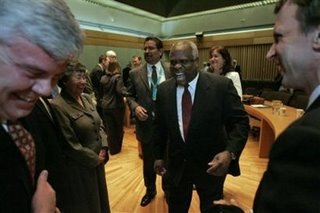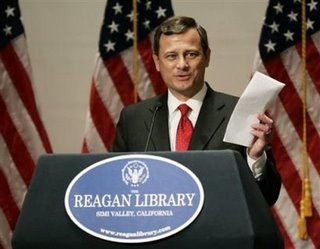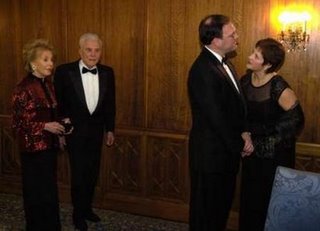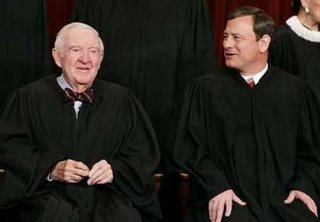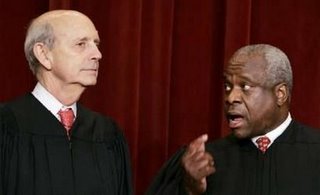In case you missed it, there were anti-war protests this weekend. You may have missed these protests because they weren't well attended in the U.S. (with some exceptions). Check out these pictures taken at
the San Francisco rally. Personally, I don't agree with the goals of these individuals, yet I have a soft spot in my heart for them. I feel bad for them because I'm almost certain that I, Lockean property rights advocate and right wing sympathizer that I am, would be a better protester and activist than they are.
Let's look at why these protests fail and how to fix them...
1.
Timing is everything. I understand that the organizers wanted to have the rally on the third anniversary of the start of the Iraq War. For something like this, anniversaries are useless. Ask any random person what day the Iraq War started, and I bet they have no clue. Ignore the anniversary thing. Why on earth would you want to have a protest the Saturday morning after St. Patrick's Day? Half of the country is "sleeping it off". They don't want to get up early and march for hours. They want to eat some Froot Loops and watch a mid-morning movie. The protest only works if you can get people to show up.
2.
Dress for success. Every time I see footage or still pictures from these protests, I see protesters dressed like they are at some twisted version of UC-Berkeley's Mardi Gras. Exhibit A...

While the combination of the Moscow Hockey League Tee and the print shirt that appears to be from the Cosmo Kramer collection is unique, I don't think it presents a good image. Do not wear anything with Che Guevara's mug on it. Do not wear anything that has the words "fuck" and "Bush". Do not wear anything that is dirty. Do not wear any kind of "costume". This protest is supposed to be serious business about an important political issue, right? Then don't dress like you're at Fantasy Fest. Wear something neat and clean.
3.
Pick an issue and stick to it. Look at those pictures from the San Fran rally. Do you have any idea what this protest is about? I see anti-Bush, pro-Palestine, anti-Israel, anti-Big Oil, pro-Soviet (way to stay current...), anti-capitalist, pro-Iraqi insurgency, pro-Cuba, pro-Marxism, pro-Venezuela, anti-Republican, anti-military recruiters, and anti-U.S. signs. Some of these topics fit together, others don't. If this is a rally about the Iraq War, focus on the Iraq War. Fidel Castro has very little to do with that war. Even if you love Fidel with all your heart, this isn't the day to proclaim those tender feelings. When you blend all of these interests, the entire protest becomes one big mush of Leftism.
4.
Keep the hypocrisy to a minimum. Integrity goes a long way. Don't do this...

Something about "FREE" and the $1 "donation" doesn't work for me logically. You decry capitalism, praise socialism, then use the protest to sell your crap. That's capitalism. Hand out your fliers and underground newspapers. Don't set up a t-shirt booth. This is supposed to be political action, not a Marxist flea market. Also, keep an eye open for me at the next protest in Milwaukee. I'll be the guy selling kaffiyehs to fund next semester's tuition bill.
5.
Marginalize the weirdos. Every crowd has its loons. These protests seem to cater to them. I know that it's impossible to keep them out of the protest totally, but you don't have to give them the microphone. The Raging Grannies are just plain creepy. They are a goofy gimmick and should be treated as such. I know they've probably been at these protests since the Hitler-Stalin Pact and maybe that's earned them some cred, but they're not helping. They only contribute to the sideshow atmosphere that makes normal people (even those who might be receptive to you) roll their eyes and walk away.
6.
Ditch the cliches. No bongos. No drumming of any kind. Absolutely no dancing, especially you white people. I was at a protest at UWM a few years ago that included all these elements. Most of the "dancing" could've easily been mistaken for a grand mal seizure. Again, this is supposed to be a serious political event, not a chance to shake your ass to a bad drum beat. This city is full of clubs where you can do that if that's what you want. No "hey, hey, ho, ho" chants. No chants period. They all sound the same, and they are rarely clever. They are usually shrill, annoying, and likely to piss off anyone in earshot. Stick with non-vulgar, legible signs and a serious attitude.
If your goal is to change people's minds, I think that these protests are a waste of time. My version of protesting might be a little better at that end but probably not by much. If you want to do something worthwhile with your time, focus on winning elections. Find intelligent, articulate candidates to run for office. Support them with your time and money. This will have much more of an impact than blowing a morning and an afternoon walking around a city.
Maybe I'm missing the point. Maybe the goal isn't actual change. Maybe the goal is just to feel good about oneself. "I protested, I did my part." To me, that seems cheap and easy. Working on a campaign is a lot more time consuming. It's a real sacrifice of energy. The protest is more fun though. Maybe that's what it's about, having fun and feeling like you made a difference. It might be even simpler than that...

Protests are full of cute Palestinian girls.














